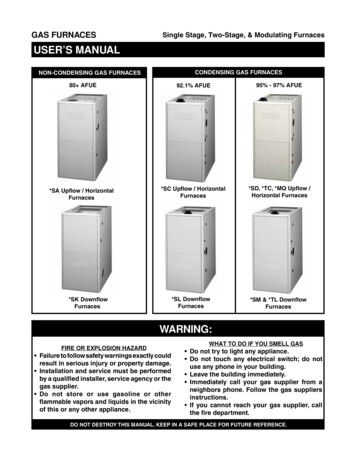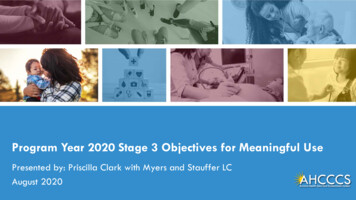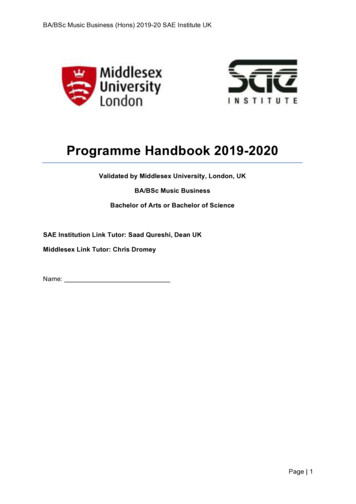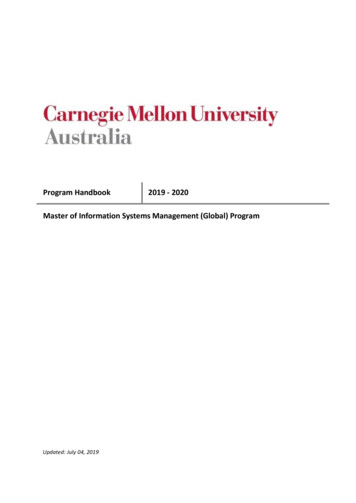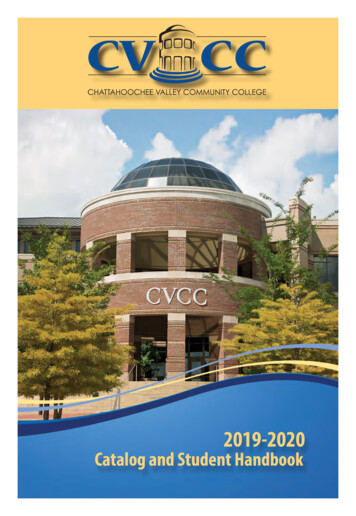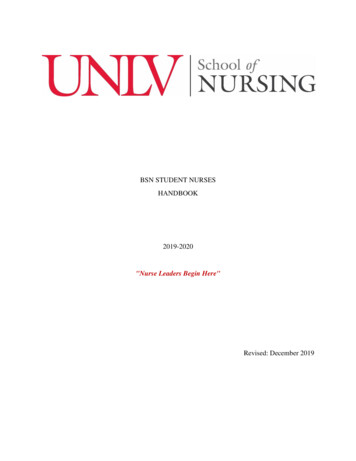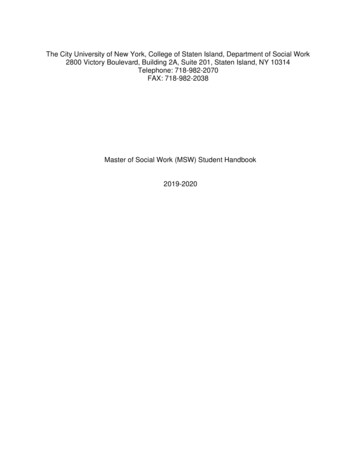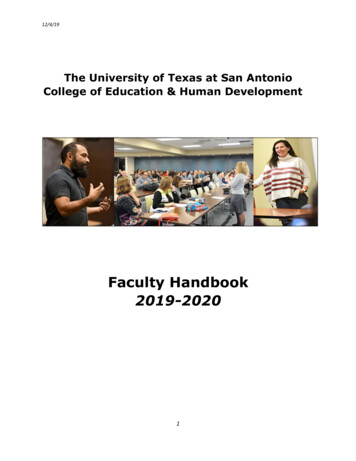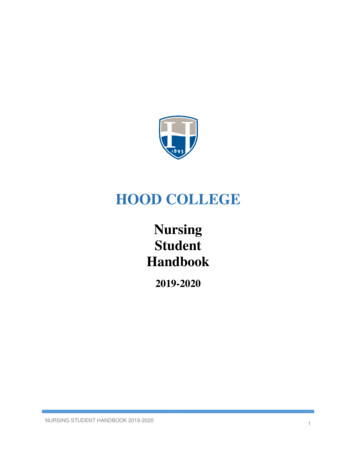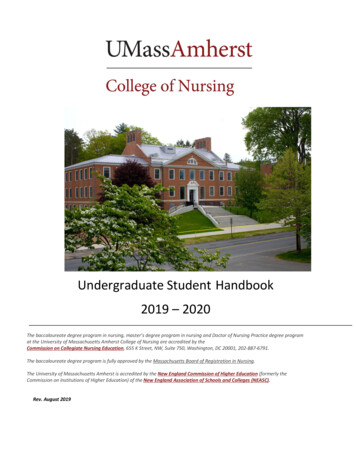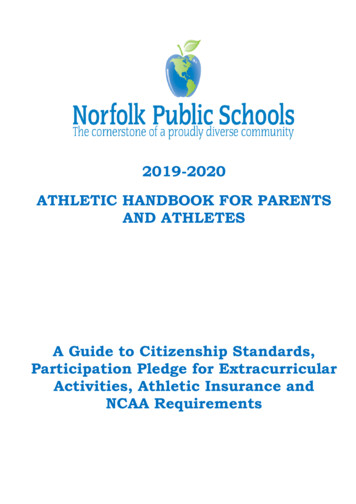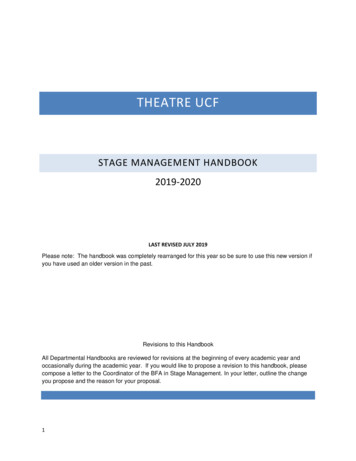
Transcription
THEATRE UCFSTAGE MANAGEMENT HANDBOOK2019-2020LAST REVISED JULY 2019Please note: The handbook was completely rearranged for this year so be sure to use this new version ifyou have used an older version in the past.Revisions to this HandbookAll Departmental Handbooks are reviewed for revisions at the beginning of every academic year andoccasionally during the academic year. If you would like to propose a revision to this handbook, pleasecompose a letter to the Coordinator of the BFA in Stage Management. In your letter, outline the changeyou propose and the reason for your proposal.1
CONTENTSTHEATRE UCF . 1STAGE MANAGEMENT HANDBOOK . 1PART I – THEATRE UCF POLICIES AND PROCEDURES . 5PRODUCTION CALENDAR GUIDELINES . 5REHEARSAL AND TECHNICAL . 5SCHEDULES . 5COPY MACHINE GUIDELINES . 8AUDITIONS. 9CASTING . 12DIRECTOR AND THE STAGE MANAGER . 12POINTS TO DISCUSS WITH THE DIRECTOR . 13DESIGN PROCESS . 13PRODUCTION MEETINGS . 14PART II – PRE-PRODUCTION. 15PREPRODUCTION . 15PROMPT BOOK (PRODUCTION BIBLE). 15CALL BOARDS . 16REHEARSAL . 16SETUP . 16PART III – REHEARSALS . 17PROGRAM AND BIO INFORMATION . 17ATTENDANCE PROCEDURES AND BREAKS. 18NOTATIONS . 18REHEARSAL PROPS . 19REHEARSAL CUES. 19REPORTS . 192
LOCKUP PROCEDURES . 20ADDITIONAL RESPONSIBILITIES . 20DESIGNER RUN AND CREW VIEW (STUDIO REHEARSAL RUN) . 21PAPER TECH . 22PART IV – MOVING INTO YOUR SPACE . 24RULES . 24LOCKUP PROCEDURES . 26CREW EXPECTATIONS . 28SITZPROBE . 30ACTORS ON STAGE / SPACING REHEARSALS . 30THEATRE UCF NIGHTLY DOOR CHECKLIST . 32FIRST SPACING/ FIRST CREW CALL . 33PRE-SET CHECKLIST . 33TECHNICAL AND DRESS REHEARSALS . 34Dry Tech . 34Technical Rehearsals . 35Tech / Dress Rehearsal . 36Dress Rehearsals . 36PHOTOS . 38PART V – PERFORMANCE . 39FRONT OF HOUSE . 39CALLING THE SHOW . 39EMERGENCY PROCEDURES . 39INTERMISSION. 41PART VI – POST-PRODUCTION . 42STRIKE . 42WEEKLY REPORTS . 423
PART VII – ASSISTANT STAGE MANAGER . 43DUTIES. 43PRE-PRODUCTION . 44REHEARSALS . 44ONSTAGE AND TECHNICAL REHEARSALS . 44PROP MASTER RELATIONSHIP . 45PERFORMANCE . 45POST-PERFORMANCE . 46EVALUATIONS / POST MORTEMS. 47PART VIII – SUMMER SEASON. 48PART IX – PRODUCTION CHECKLIST . 49PRODUCTION CHECK LIST . 50As soon as you are Assigned to a show: . 50Prior to Auditions . 50For Auditions . 50During Design Process . 50One Week Before First Rehearsal. 50Before First Rehearsal . 51For Crew Meeting . 51For Tech . 514
PART I – THEATRE UCF POLICIES AND PROCEDURESAll degree options emphasize excellence in production work as well as excellence in theclassroom and the laboratory. To be an artist, it is necessary to have an understanding of one'stime and place in society as well as something to say about it. We believe this is bestaccomplished by combining a strong liberal arts education with intensive practical training intheatre history, theatre arts, crafts, and skills. In addition, we strive to instill within our studentsthe importance of process as well as product. A successful theatre product, though ultimatelyessential, is of little long-term benefit to the student who does not understand and appreciatehow that success was achieved. Regardless of degree, or career choice, all theatre majors mustdemonstrate continued growth and development as theatre artists and practitioners with highprofessional standards of competency if they are to successfully complete their course of study.PRODUCTION CALENDAR GUIDELINES The Production Calendar includes all milestones pertinent to the Production from its’inception to strike. Reference the Department Production Handbook for further clarification. Please check the calendar daily for changes: Please check with the StageManagement Advisor and (PM) Production Manager (Gary Brown) for Calendarinformation.REHEARSAL AND TECHNI CAL SCHEDULES The overview of each show’s rehearsal and performance schedule is on productioncalendar on the UCF website. The details of the rehearsal schedule will be planned with the Director. Meet with thedirector to create this calendar. Send the preliminary Production calendar to the StageManagement Advisor for approval. A preliminary schedule will be published for the FirstDesign Meeting. An updated schedule will be published BEFORE the auditions for thatshow. The final version of the calendar is due the first day of the semester in which youwill start rehearsals.5
A daily schedule should be created for every rehearsal and performance. This scheduleshould be posted on the callboard by 10am every day and emailed to the cast (and crewfor performances) by 8 am the next morning. Rehearsal Scheduling Rules: Any deviation from the list below must be approved by theArtistic Director, Director of Production, Production Manager and Stage ManagementAdvisor.oFrom the first rehearsal until the first technical rehearsal, a show canrehearse a maximum of 23 hours per week and must have one complete 24hour period off on a weekend (either Saturday or Sunday). A musical canrehearse 138 hours over a six week period and non-musicals can rehearse92 hours over a four week period prior to actors on stage. Any deviations notpreviously approved should be noted in the report and the Stage Managershould notify the Stage Management Advisor.oWeeknight rehearsals can be up to 4 hours in length. They cannot beginBEFORE 6pm or end AFTER 10:30pm. All work will be done in this period(set up, dressing in rehearsal items, warm ups, etc). Any deviations from thisschedule should be discussed with the Stage Management Advisor.oStage Managers should be able to set up in an additional 30 minutes andstrike in 30 minutes (for a total 5 hour block). A production which requires alonger set up will need to accommodate this during rehearsal hours. Anydeviations from this schedule should be discussed with the StageManagement Advisor.oIn the Event that the production chooses to rehearse only 3 hours on eachweeknight (ex: 7pm – 10pm), an extra 15 minutes of warm ups/prep time may bescheduled (ex: 6:45pm warm up).oWeekend Rehearsals can consist of the remaining rehearsal hours, but inany event no more than 7 out of 8 hours. There must be a 1 hour break afterno more than 5 hours of work.oStraight Six Option: IF the following conditions are met, a production maychoose a straight six day on their weekend rehearsal day.6
1. rehearsals are 3 hours total on the weeknights.2. the 15 min additional warm up time is not utilized3. the intention to use the straight six is announced to the company atthe beginning of the rehearsal process.oAdditional Notes regarding Straight Six Option:oThe six-hour rehearsal block shall constitute the entire work schedule forthe day.oEach six-hour rehearsal block used shall count as eight hours for thepurposes of calculating the hours rehearsed in a work week.oWithin the six-hour rehearsal block, there shall be at least 50 minutes ofbreak time to be distributed in accordance with established break rules,except that one break shall not be less than 30 minutes.oAll students participating in a production must sign up for the appropriateparticipation course. Since rehearsal and performances are a Universityclass, all dates and times must be posted in advance and scheduled duringthe time frame allotted on the calendar.oRehearsals must begin and end on time to give students the opportunity toeat dinner, do homework, attend other responsibilities, etc.oWeekend technical rehearsals use Saturday and Sunday. One day willconsist of 10 hours (out of a 12 hour span), referred to as a 10/12. This istypically the Saturday of tech weekend. The other weekend day is scheduledas an 8 hour day (out of 10 hour span), referred to as an 8/10. Usually this isscheduled for Sunday but can be reversed depending on the show.However, The Stage Management Advisor and Director of Production, inconsultation with the Artistic Director and Production Manager, will determineif a second 10/12 is needed for the production.oTheatre UCF will make best efforts to not schedule Performances orrehearsals during University Holidays, or during finals.7
oWeeknight Technical rehearsals consist of 3 parts. Technical SpacingRehearsals, and Dress/ Technical rehearsals, and the Final Dress.Weeknight Technical rehearsals will be no more than 5 hours in length(beginning after 6pm and ending by 11pm). This includes the entirety of thecall for both cast and crew. Higher Level Production and Creative positionsmay then be called for an additional Production Meeting at the end of thenight. The Stage Management Advisor and Director of Production, inconsultation with the Artistic Director and Production Manager, will determinethe length of these calls.oOften, crew members will be called earlier to preset before the cast is called,but some productions may require a simultaneous call. In that case, the castwill not begin work onstage until the stage is preset, but may be used fornotes, costume fittings, or any other work as needed. Costume Fittings will also be scheduled over the course of the rehearsal process. Amember of the Stage Management Team is required to physically stop by the CostumeShop daily for any updates. This will also keep the lines of communication open. TheCostume Shop will let the Stage Managers know during their daily check-in/shop walkwhich actors need to be seen. The Costume shop will make best efforts to alert the SMteam to the next week’s fittings needed by the end of the previous week. Typical fittingslast 30 minutes, but may last longer as needed. Stage Managers should give the actorsat least 24 hours notice for a fitting and contact them by email and phone if necessary.COPY MACHINE GUIDELINES The copy machine should be used for show related documents only. Using thedepartment copy machine for any other purposes will result in an incident reportbeing filed resulting in departmental probation and removal from productionassignments. Please contact Theatre Department Secretary Samuel Waters for your show copycode. If the machine breaks please contact Theatre Department Secretary Samuel Watersimm
theatre history, theatre arts, crafts, and skills. In addition, we strive to instill within our students the importance of process as well as product. A successful theatre product, though ultimately essential, is of little l
